Poemsia Read online
Also by Lang Leav
Fiction
Sad Girls
Poetry
Love & Misadventure
Lullabies
Memories
The Universe of Us
Sea of Strangers
Love Looks Pretty on You
Poemsia
copyright © 2019 by Lang Leav. All rights reserved. No part of this book may be used or reproduced in any manner whatsoever without written permission except in the case of reprints in the context of reviews.
Andrews McMeel Publishing
a division of Andrews McMeel Universal
1130 Walnut Street, Kansas City, Missouri 64106
www.andrewsmcmeel.com
ISBN: 978-1-5248-5852-0
Library of Congress Control Number: 201994401
Cover art and Verity bitmoji on page 254 by Cameron Stewart, all other bitmoji characters © VectorStock.com
This book is a work of fiction. Names, characters, places, and incidents either are products of the author’s imagination or are used fictitiously. Any resemblance to actual events or locales or persons, living or dead, is entirely coincidental.
ATTENTION: SCHOOLS AND BUSINESSES
Andrews McMeel books are available at quantity discounts with bulk purchase for educational, business, or sales promotional use. For information, please e-mail the Andrews McMeel Publishing Special Sales Department: [email protected].
For Michael,
who saw this book in a dream.
Contents
Part One
(Sydney)
Part Two
(New York)
Epilogue
Acknowledgments
Part One
“something secret is going on,
so marvelous and dangerous
that if you crawled through and saw,
you would die, or be happy forever.”
—Lisel Mueller, “Sometimes, When the Light”
One
(Sydney)
On a blue-sky day in Centennial Park, I sat on an old tartan rug with my best friend, Jess, who had her head buried in the latest poetry book by Mena Rhodes. It had just hit the shelves, so the first thing we did that morning was race to our local bookstore, Berkelouw. We were thrilled to see a stack of Mena’s books on a table up front, carefully arranged like a Jenga tower. We made a beeline and picked up a copy. Now it was barely noon, and between the two of us, we had practically torn through the entire book. “Her best one yet,” Jess hugged it to her chest.
“I loved the one about—” I started.
“The rings of Saturn?”
We looked at each other and sighed in unison.
Jess put the book down, and we stretched out on the rug, faces soaking up the sun. It had gotten cold early this year, as if someone had flicked a switch. We didn’t mind, though. It meant we could break out our sweaters. We were obsessed with them. The cable-knit ones we wore today were identical, apart from hers being mustard yellow and mine a retro red. Sweaters were the only item of clothing we could agree on. Otherwise, our choices were in complete contrast. Take now, for example. I had on pale denim jeans and ballet flats. She was in tiny shorts, fishnet stockings, and combat boots. My chestnut-brown hair was thick and unruly. Jess’s jet-black locks hung straight and glossy all the way to her hips. She was tall and rakishly thin; I was petite and curvy.
I wanted to be a poet like Mena Rhodes. Jess dreamed of being a famous artist, someone wild and provocative like Tracey Emin.
She’d turned nineteen six weeks ago, which is the same age I would be next week. But from the beginning of our friendship, it always felt like she was so much older. It probably had to do with how Jess was always looking out for me. I knew I could count on her no matter what.
I met Jess when I was seven, shortly after my parents were killed in a car accident and I had to move into Nan and Pop’s small apartment above Pop’s secondhand bookstore, Wolf Books. It was an old, rambling establishment with a network of nooks and crannies. Customers likened it to a maze.
Pop’s office was at the top of a steep flight of stairs separated from the rest of the store by a rope. His big mahogany desk was there, surrounded by piles and piles of cardboard boxes teeming with old books. One day, I was playing in there alone, and I summoned my imaginary friend, Posey Darling. I asked her whether she wanted to play hide-and-seek and was stunned to hear a little voice respond, “OK.” I looked around a little fearfully and was relieved to see a tiny doll-like girl peek her head around the door.
“Hi, I’m Jess.”
“I’m Verity, Verity Wolf.”
Her eyes widened. “Wolf? Is . . . is this your shop?”
“It’s my grandad’s,” I had said, a little airily. Feeling bold, I added, “By the way, you’re not allowed up here.”
She put her hands on her hips and glared at me. “Then why did you ask me to play hide-and-seek with you, stupid?”
From that day on, we were inseparable. I have barely any childhood memories without Jess in them. One time we built a fort by stacking piles of books like bricks. It took days, but all the effort was worth it. We called it the Book Cave. Nan helped me furnish it with sleeping bags, blankets, and pillows so we could stay the night. We took turns reading Deenie out loud by flashlight. When I got to the part where Deenie mentions her “special place,” Jess once interrupted me, “You know she’s masturbating, don’t you?”
“Duh!” At the time, I had no idea what masturbating meant and got a funny reaction when I asked Pop about it the next day.
Jess’s mother, Mei Lyn, was a barrister who worked around the clock. She was hardly ever home, and when she was, her mind was preoccupied with work. Their apartment was small and filled with expensive antique vases, so we had to be careful not to knock anything over. That’s probably why Jess spent so much time at our place, where we could run wild and not have to worry about all that stuff.
We stuck together all through our school years, passing notes to each other in class and spending our lunch breaks plugged into Jess’s phone, chilling to her latest playlist on Spotify. Jess had a knack for curating popular music lists from every genre imaginable and somehow making it all work. Whenever a school dance came around, she was always the one asked to DJ.
On weekends, we’d cycle out to junk shops, markets, and garage sales, searching for rare books. If we stumbled on something valuable, Pop would be over the moon—like the time we found a copy of Kiss Kiss with Roald Dahl’s autograph on the inside jacket. We didn’t get lucky all that often, but when we did, the look on Pop’s face was priceless. He kept a glass cabinet behind the counter especially for his collection of autographed books. He swears he will never sell a single one, even though we could really use the money.
One summer, Pop built a window seat in my room, which overlooked the courtyard. Jess and I often saw Nan pottering around her bonsai garden. She put her heart and soul into that tiny patch of sunshine.
Years went by, and the tiny trees grew fractionally taller, their branches thickening and twisting into knots like Nan’s hands as she faithfully tended them. Now she moved slower and was often out of breath. But that didn’t stop her from hiding packs of popping candy in our pillowcases or jumping out at night with a sheet over her head to scare the bejesus out of us.
During all those years, Jess and I were always there for each other. I was with her the first time she fell off her bike and took the skin off her knees. And when she was dumped by her first boyfriend, I was there with ice cream and tissues. I held her hand that day at the doctor’s clinic when she asked for the morni
ng-after pill in a shaky voice. And she was there to talk me through my first period (she got hers the year before). When I got blind drunk at a party, she sat with me on the bathroom floor, holding my hair back as I retched into the toilet bowl. And just last year, when Nan died suddenly of a stroke while tending to her beloved Japanese maple, Jess was there. More than my best friend, she’s family. We know every last thing about each other, and she’s the only person in the world I have ever allowed to read my poetry.
I started writing poetry after Mum and Dad died. It became a way for me to feel closer to them. Whenever I had a pen in my hand, it was like they were still with me, even though so much time had gone by. When we lost Nan, I started writing for her as well. I suppose it was a way for me to deal with the sad things in my life. I never thought much about it beyond that. It wasn’t until recently, when poetry came back into vogue, that I dared to believe I might write a book someday. I owed this dream to Mena Rhodes, who was the first poet I knew to post her poetry online and unwittingly start a movement.
“Do you think Mena has a muse?” Jess’s voice cut through my thoughts, bringing me back into the present. “She writes about love so convincingly. Do you think something happened in her life—or there was someone who inspired it?”
“Who knows? She’s so tight-lipped about her private life. But she did mention once in an interview that she’s inspired by ‘the collective human experience.’”
“But her work is so powerful—especially the dark stuff. I don’t know how you could write about something realistically unless you’ve lived through it.”
“What about authors like C. S. Lewis? I bet he’s never been to Narnia.”
“I get how stuff like scenery and dress-ups can come from pure imagination—how it can be manufactured. I mean, our lecturers go on about it all the time.” Jess had just started her first semester at the College of Fine Arts, while I was taking a gap year to help Pop with the store. “But I think visualizing something is completely different from writing about a feeling that you’ve never felt before. Remember that time I broke my leg?”
“Totally! You were in a foul mood for the whole summer.”
She laughed. “I was such a brat.”
“Understatement of the century! I told you to cheer up, and you threw a potted plant at me.”
“Wasn’t it just a plastic plant?”
I glared at her. “It was a cactus, Jess. It grazed my arm, and your mum had to pull out the spikes with tweezers. Remember?”
She gave me a sheepish look. “Oh! Now I do. You gave me the silent treatment for days afterward. You had no idea what it was like. It felt as though my leg was a hunk of lead and fire ants were crawling under my cast. I was hardly getting sleep, and the worst thing was I was stuck at home. It was hell! Anyway, that’s my point. Even though you were there with me, you weren’t me. You’ve never broken a bone, so you could feel sympathy for what I was going through, but you couldn’t feel empathy for me. I think that would be possible only if you’d experienced it yourself. Then again, you write some of the most heart-wrenching love poems I have ever read, and I know for a fact your only muse is a certain boy in a K-pop band—”
“Oh my God, you’re never going to let me forget that, are you?”
She giggled. “Never! Busting you making out with your phone was priceless.”
I cringed. Jess knew way too much about me.
“Seriously, though. How do you do it, Vare? With art, it’s vague. Everything is open to interpretation. But writing is definite. Nowhere to hide. Nothing else—not film, music, or art—gets down to the bare bones like poetry.”
I chewed on my bottom lip. “It’s hard to explain. I get this emotion way down in the pit of my stomach; I feel it welling up. Then my chest gets heavy. It happens when I think about Nan.”
Jess looked sad. She loved Nan as much as I did. For ages after Nan died, we had moments when we’d talk about her as if she were still there. Then the pain would hit us—she was gone, and we’d never see her again.
I continued, “It’s like your entire body is pure emotion—fluid, like music. That’s the only way I can describe it. Then words appear, like lyrics that complement the music. The words don’t always reflect the feeling, even if they seem to hold true to the sentiment. That means the thought originally was about missing Nan, but the poem is about much more. I think it’s because loss is universal.”
“Exactly! When you lose someone you love, it makes no difference whether they’re a family member or your soul mate. It hurts the same.”
“The feeling is like the ocean. Sometimes calm and still; other times, it’s a hurricane. So maybe it’s like that for Mena, too.”
“You know, I think your poems are just as good as hers.”
“You’re only saying that because you’re my friend.”
“Well, if you’d stop being so damn stubborn and share your work on Instagram, I bet you’d get a second opinion.”
“No, I don’t think I’m ready—not yet.”
“I know you, Vare; you’re never going to be ready.” She sat up, her eyes scanning the park. “There!” She said pointing to a random girl, cycling by on her vintage bike.
I propped myself up on my elbows. “Why are you pointing at her?”
“I bet you five bucks she would love your poetry. I bet you anyone in this park would love it.”
I groaned. “You’re high.”
A young mother walked by pushing a stroller. “There!” Jess pointed again, and I swatted her hand down before we caught the lady’s attention. “She’d love your poetry, too.”
I sat up straight. “Jesus Christ, can you stop pointing at random people?”
Jess turned and grabbed my shoulders, giving me a little shake. “Seriously, Vare! Even my mother loves your poetry, and that woman hires a professional to get in touch with her emotions.”
I smirked. The first time we saw the movie The Terminator, we couldn’t help but draw similarities between its killer robot and Jess’s mother. Mei Lyn was a fast-talking, always-on-the-go powerhouse of a woman. God knows how she ended up with a daughter like my bohemian, free-spirited best friend.
Then a group of sulky-looking schoolgirls walked by. Jess’s eyes lit up. I glared at her. “Don’t even think—”
Her hand shot out. “There!”
One girl looked directly at us, and I wanted to die.
“Great,” I muttered under my breath. “She’s coming over.”
“Stop freaking out. It’s a schoolgirl, not Pennywise.”
Easy for her to say, I thought, my heart in my throat.
The girl stopped at the edge of our rug, staring down at Jess. “Do I know you?”
“Definitely not.”
“Then why were you pointing at me?”
I glanced nervously at her friends, who had stopped and were looking over at us with a hint of animosity.
“Do you like poetry?” Jess asked. The girl’s eyes narrowed. “What the hell are you talking about?”
Jess picked up Mena’s book and flashed it at her. The girl’s face lit up. “Oh my God! Is that her new one?”
Jess nodded. “Fresh off the shelf.”
“I love Mena; like, I’m literally obsessed with her! I follow her on Instagram and Twitter.”
“Well, if you like Mena’s work, you might want to check out Verity Wolf.”
The girl wrinkled her brow. “I’ve never heard of her.”
“You’re in luck! Because she’s right here, sitting in front of you.” Jess jabbed my shoulder with the tip of her finger, and I groaned out loud.
The girl rolled her eyes. “Is that right?”
“She’s going to be famous one day—just you wait and see!”
“Don’t listen to my friend—she’s crazy.” I gave the girl an apologetic smile.
“
Could you read a few of her poems? I want to know what you think, and you can be brutally honest,” Jess asked.
The girl smirked. “Sure, I’ll read some of her poems.”
“Seriously, can you just ignore this raving lunatic—” I started.
The girl crossed her arms and glared at me. “Hey, I walked all the way over here, so you’d better show me something.”
I blinked at her and considered my options. I couldn’t think of a way out, so, reluctantly, I reached into my back pocket and pulled out an old receipt book and passed it to her. Pop kept a stack of them in his office and didn’t mind when I used the odd one to jot down my poems. I always kept one handy, in case a poem came to me out of the blue.
I watched the girl’s face as she flicked through the little book, but her expression gave nothing away. I snuck a glance at Jess, who was now grinning like a Cheshire cat. Finally, the girl looked up, and my heart practically stopped.
“Hey, you’re, like, actually good! Do you have an Instagram?”
“Um, yeah, I do! If you want to add me, my name’s Verity Wolf.”
She had her phone out before I even finished my sentence.
“Followed you,” she said. “But you haven’t posted anything yet.”
“I’ll post some poems today,” I promised.
“Cool,” she said, before sauntering back to her friends.
My heart was pounding so loud in my chest I felt as if it were going to burst. “I swear, one of these days, I’m going to kill you, Jess.”
She gave me a smug look. “I think you owe me five bucks.”
Two
The old, rusty bell clanged noisily as I pushed through the glass door of Wolf Books. The bell had been a fixture in there ever since the store opened—even before I was born. Jess told Pop he should replace it with a modern door chime, but Pop thinks the bell gives the store character. He’s probably right. The bell sometimes even got a mention when someone blogged about the old-world charm of our bookshop. But the real star is Pop. Five foot eleven and broad shouldered, he could come across as slightly menacing when we had unwelcome visitors like salesmen or religious zealots. He had a shock of white hair that made him look slightly mad and gray-green eyes that were full of either contempt or love depending on who or what was in front of them. Right now, he had just finished stringing up a banner.

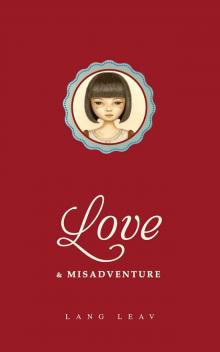 Love & Misadventure
Love & Misadventure Memories
Memories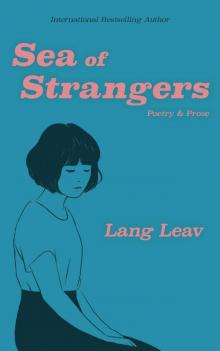 Sea of Strangers
Sea of Strangers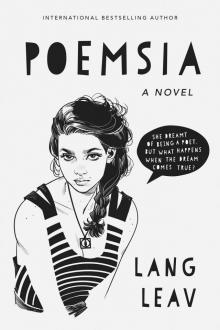 Poemsia
Poemsia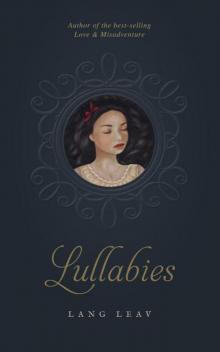 Lullabies
Lullabies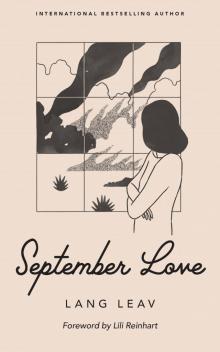 September Love
September Love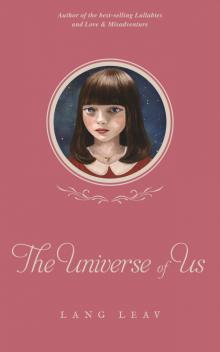 The Universe of Us
The Universe of Us Sad Girls
Sad Girls